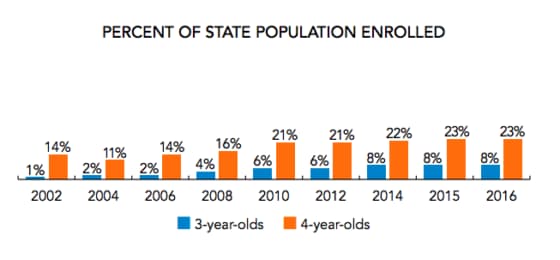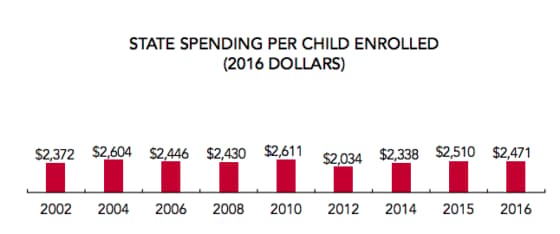
By Ann Schimke, Chalkbeat
While Colorado ranks near the back of the pack for state preschool funding, it gets relatively high marks for providing preschool access to the state’s 3-year-olds, according to a report released Wednesday by the National Institute for Early Education Research.
Colorado ranked 11th for 3-year-old access among 33 states offering preschool to 3-year-olds. The state-funded Colorado Preschool Program, which is for children with certain risk factors, served about 5,400 3-year-olds and about 15,700 4-year-olds last year.


State officials said that observers should take Colorado’s middling benchmark score with a grain of salt because while the state didn’t get credit for having certain standards enshrined in state policy, the standards are widely practiced by school districts that participate in the Colorado Preschool Program. One example is the benchmark that calls for vision, hearing and health screenings of preschoolers — Colorado didn’t check that box, but most districts conduct the screenings.Besides gauging preschool funding and access, the new report revealed that Colorado meets five of 10 benchmarks designed to judge preschool quality. Last year, the state met six of the benchmarks, but several benchmarks changed this year in what the research institute described as an effort to raise the bar.Colorado ranked 24th of 44 states for 4-year-old preschool access in the state-by-state report, slightly worse than last year. Seven states, including Colorado’s neighbors, Wyoming and Utah, don’t fund preschool at all.
Two other benchmarks that Colorado doesn’t meet include a requirement for lead teachers to have a bachelor’s degree and assistant teachers to have a Child Development Associate credential.
Cathrine Floyd, program director for the Colorado Preschool Program and Results Matter Program at the Colorado Department of Education, said the degrees are highly encouraged by the state but not required. That’s because some state-funded preschool slots are offered at community-based preschools that would not be able to afford to pay teachers if they all had higher-level degrees, she said.
Among the five benchmarks Colorado meets on the revised list are two related to class size and staff-student ratio, one related to teacher training, one related to state early learning standards and one related to preschool curriculum.
Floyd and her colleagues described the annual report from the well-regarded National Institute for Early Education Research as a good starting point for conversation, but said the state’s annual Colorado Preschool Program report provides more detail and context about Colorado’s progress.
Chalkbeat is a nonprofit news site covering educational change in public schools.












